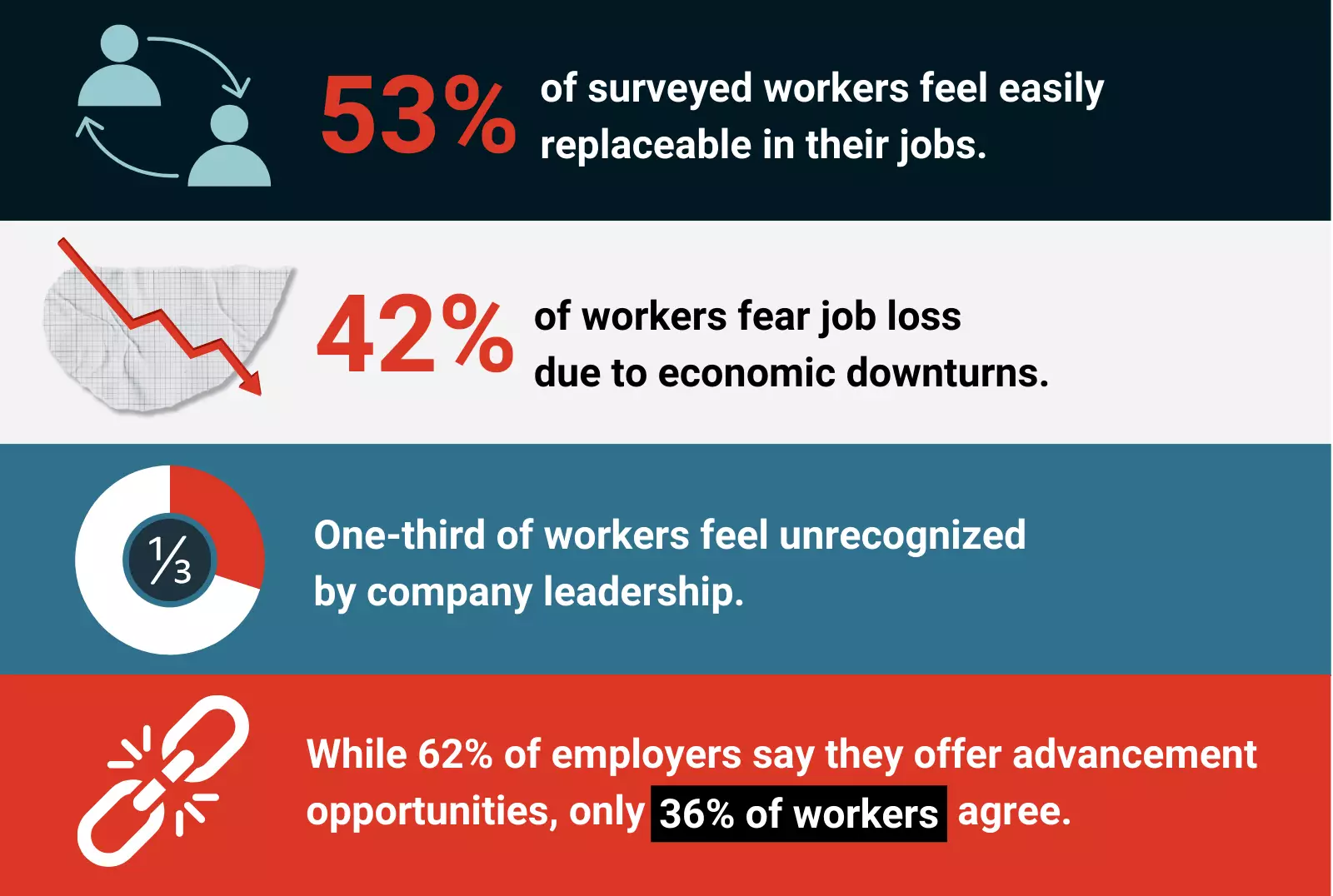How to prepare for an unpredictable job market
This article has been vetted by University of Phoenix's editorial advisory committee.
Read more about our editorial process.

Reviewed by Jessica Roper, director of Career Services at University of Phoenix
Whether you consider the rising prices of almost everything inflation, whether you see the advent of artificial intelligence as a boon or bust, whether you follow the stock market closely or not at all, one thing is for certain: The job market of 2024 looks very different from that of 2021.
“Despite some economists saying all the indicators are strong, we have an election year and that always makes an impact. … We also have possible wars on the horizon … [and] we don’t know what impact disasters might have,” observes Jamie Johnson, MS, NCC, CCC, a career coach at University of Phoenix. “But the main thing I always tell people is that no matter how the economy looks, even in the depressions and the recessions people always find opportunity.”
Here’s how to be among the prepared.
Prepare for job opportunities with our free career tool kit. Plus, explore a collection of free tools and resources.
Factors of an unpredictable job market
To understand how a job market can turn on a dime, look no further than the COVID-19 pandemic. Almost overnight, companies’ workforces shifted to home offices, and employees had to navigate staying connected when they thought twice about just going to the grocery store.
Not everyone made that transition smoothly, Johnson says. Some workers retreated from organizations, associations and professional development because they felt they needed to prioritize safety even to the point of isolation.
“I think that’s been probably one of the greatest challenges I’ve seen with my students, alumni and personal clients,” Johnson says. “Many people became invisible [during the pandemic.”
Unpredictability hinges on more than pandemics, though. As Johnson points out, the following factors can all destabilize a job market:
- Industry disruptors: The most obvious example today may be AI, but any technological advancement can recalibrate an industry.
- Disasters (natural and otherwise): Whether it’s a hurricane, a collapsed bridge or an earthquake, disasters can upset supply chains, economic priorities and workforce availability.
- Personal loss or tragedy: Divorce, job loss and bereavement can cause people to withdraw from other people and their careers.
With the exception of personal traumas, any of these situations can spur on companies to restructure, reduce staff, move jobs overseas and otherwise cut costs, Johnson says.
The silver lining? While you may not know which crisis will come next, it’s a safe bet that some crisis will arrive. Preparing accordingly can prepare you for anything.
“We can turn a crisis into an opportunity if we are flexible and aware and don’t allow ourselves, as many people did with COVID, to become invisible,” Johnson says.
read similar articles

How to develop career goals (and a road map to reach them)
Gauging public perception
While economists use many tools to evaluate and predict economic health, one of the most telling may just be how workers perceive the situation for themselves.
According to the 2024 Career Optimism Index® study, which measures American workers’ view of workplace opportunity, the current economic climate presents a few challenges. Specifically, while most workers are optimistic about their futures, they’re experiencing a sense of stagnation and replaceability in the workplace.
So, what keeps these workers (78%) feeling so optimistic about the future of their careers? It may just be their preparedness.
Ways to prepare for anything
When it comes to preparing for the unexpected, there are a few general rules to abide by. “If you are prepared professionally, you are visible, you are up to date with your skills, you are targeted, you are constantly seeking ways to develop yourself, you communicate and you build community,” Johnson says.
OK, but what does that look like? In addition to creating a targeted resumé with the right keywords for an AI-powered world, Johnson recommends the following six steps:
1. Exceed employer expectations. No quiet quitting here! (And definitely no loud quitting.) “We get opportunities all the time in my department, and I jump at every one,” Johnson says, citing the interviews she’s recently started giving to media. When you are an indispensable team player, she explains, good managers will take note and find ways to enhance your career. If you don’t have a good manager, then you can take your skills and energy to recruiters, headhunters and other employers.
2. Upskill, upskill, upskill. Career advisors often tout this one, and it’s great if you work in a field where you can add certificates and certifications to your resumé. If you don’t work in such an industry, however, you don’t have to sit idly by. Taking courses or earning certificates in cross-functional technical skill sets, like a software program or project management, can be helpful, Johnson notes.
3. Reflect on — and record — your accomplishments. Even for career advisors, keeping a current resumé with your accomplishments and accolades can be a challenge. Johnson maintains a career journal; setting a recurring appointment on your calendar to update your resumé each month also works.
4. Stay current. Professional associations, community-based groups and business-oriented organizations, as well as classes and conferences, can keep you informed of what trends are in play (and how they might affect your career).
5. Build your community. “I think that we forget that our people are our people,” Johnson says. “We forget to think about how we can all help each other.” Whether you’re looking to connect with a particular person or just want to grow the professionals with whom you interact, seek out recommendations and opportunities to connect through groups, events and one-to-one conversations.
6. Get to know your manager. “Does your manager know what you can do?” Johnson asks pointedly. Yes, you work with your team daily, but keep them informed about what you’re doing in terms of upskilling, earning recognition and completing projects. It will help position you for new opportunities.
At the end of the day, these steps point toward understanding and advocating for yourself, which are two things that can help you weather any professional storm.
“That is a strong foundation for any kind of situation, and it’ll help us no matter what we face,” Johnson says. “Those are things you can have in good times and in bad.”
Career resources at University of Phoenix
University of Phoenix equips its students and graduates with an array of resources to help them prepare for anything. These include:
- Career Services for Life® commitment: Available to UOPX students and graduates, this offering comprises complimentary career coaching, including guidance on how to build a personal brand and write a resumé.
- Free career templates: Browse a range of downloadable guides and templates to help you optimize your LinkedIn® profile, get ready for a job interview and write a resumé and cover letter.
- Career With Confidence™ newsletter: Get career insights every week via UOPX’s LinkedIn newsletter.
LinkedIn is a registered trademark of LinkedIn Corporation and its affiliates in the United States and/or other countries.

ABOUT THE AUTHOR
Elizabeth Exline has been telling stories ever since she won a writing contest in third grade. She's covered design and architecture, travel, lifestyle content and a host of other topics for national, regional, local and brand publications. Additionally, she's worked in content development for Marriott International and manuscript development for a variety of authors.
want to read more like this?




